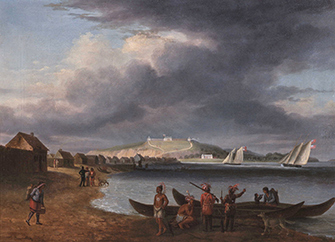Burial traditions vary from tribe to tribe, but one constant remains among them: caretaking of the dead is something all tribes consider sacred.
“Brother, they did not allow our dead to rest. They dug up their graves, and the bones of our ancestors were thrown away and we could never find them to return them to the ground.”
Odawa War Chief Blackbird, 1813

Mackinac State Historic Parks
The War of 1812 was devastating to warriors and civilians of countless tribal villages alike, and in many cases, traditional burial practices were not honored. During a council with the British and their allied Indian warriors along the Grand River near Niagara in 1813, Odawa war chief Blackbird gave a vivid speech detailing how American soldiers were desecrating the burials of tribal people:
“Those behind us came up and did mischief. Brother, last year at Chicago and St. Joseph’s the Big Knives destroyed all our corn. This was fair, but, brother, they did not allow our dead to rest. They dug up their graves, and the bones of our ancestors were thrown away and we could never find them to return them to the ground.
“Brother, I have listened with a good deal of attention to the wish of our father. If the Big Knives, after they kill people of our color, leave them without hacking them to pieces, we will follow their example. They have themselves to blame. The way they treat our killed, and the remains of those that are in their graves in the west, makes our people mad when they meet the Big Knives. Whenever they get any of our people into their hands they cut them like meat into small pieces. We thought white people were Christians. They ought to show us a better example. We do not disturb their dead. What I say is known to all the people present. I do not tell a lie. Brother, it is the Indian custom when engaged to be very angry, but when we take prisoners to treat them kindly.”
Blackbird’s words are a direct glimpse into the problems indigenous people were facing to protect their dead and their traditions. Warriors of native nations would not go back and dig up the graves of dead enemies; such actions were forbidden. Highly disrespectful actions against killed warriors spurred action. The dead could not defend themselves; it was the responsibility of the living to do so.
The indigenous people of the United States would fight for nearly two more centuries to have their dead honored. In 1990, the Native American Graves Protection and Repatriation Act was passed. This federal law enables tribes and lineal descendants to reclaim ancestral remains from museums and federal agencies in the United States. To this very day, tribes are working to return their sacred dead back to the earth.
Last updated: August 14, 2017
